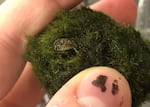
A zebra mussel nestled inside a marimo ball at a Seattle-area pet store. Zebra mussels are an invasive species that could wreak havoc on Northwest waterways.
U.S. Geological Survey
Wildlife agencies in Oregon and Washington are urging pet stores to remove a popular aquarium product from shelves after discovering invasive zebra mussels inside them.
These marauding mollusks breed quickly and can wreak havoc on natural waterways. Recent, unexpected sightings in Northwest pet stores have wildlife officials sounding the alarm.
“It would be devastating to our environment if these ever got established in Oregon or the Pacific Northwest,” said Rick Boatner, the invasive species wildlife integrity supervisor at the Oregon Department of Fish and Wildlife.
A PetCo employee in Seattle first found zebra mussels in “Betta Buddy Marimo Ball” products in early February.
“I work in the aquatics department, and almost every shipment of these moss balls that I have unpacked for the past two months has had mussels nestled in the moss balls,” reads a specimen filing with the U.S. Geological Survey.
ODFW on Wednesday visited a pet store in Salem, where officials found zebra mussels in the same product.
The agency is urging pet stores to remove the Betta Buddy Marimo Ball from shelves immediately.
Related: What are invasive species and why are they a threat to Oregon?
Zebra mussels are small but destructive. They eat up algae that native species need to survive. The USGS warns they can also attach to and incapacitate native mussels. They clog storm drains, drinking water systems, irrigation and dams. Zebra and quagga mussel infestations in the Great Lakes region have cost hundreds of millions of dollars annually.
People should not buy the product. Those who have can safely dispose of the marimo balls by freezing or boiling them before putting them in the garbage. Don’t lay the algae as fertilizer or flush the balls down the toilet, ODFW says, as the mussels could get into the water system.
The agency also encourages people to clean aquariums by first removing fish, then letting a diluted bleach solution (one cup of bleach per gallon of water) sit in the aquarium for 10 minutes. Disinfect filters, gravel and other items in the aquarium before disposing of the solution down the sink or toilet.
Oregon — and much of the region — has largely avoided the zebra mussel mayhem through strict monitoring of watercraft, according to ODFW.
“We were not expecting zebra mussels from moss balls,” Boatner said.
Related: Quagga mussels are tiny invaders with big consequences
Marimo is not moss but actually an algae that grows into velvety, green balls in lakes. They’ve become popular as aquarium decor that fish use as luxurious couches or fuzzy playthings. Marimo balls are also popular house plants.
The current outbreak is tied specifically to the Betta Buddy marimo product, which Boatner said ships from Ukraine, where zebra mussels are a native species. He added that marimo products that ship from other countries are likely a lower risk, but people can check for evidence of zebra mussels like shell fragments and report findings to ODFW.
